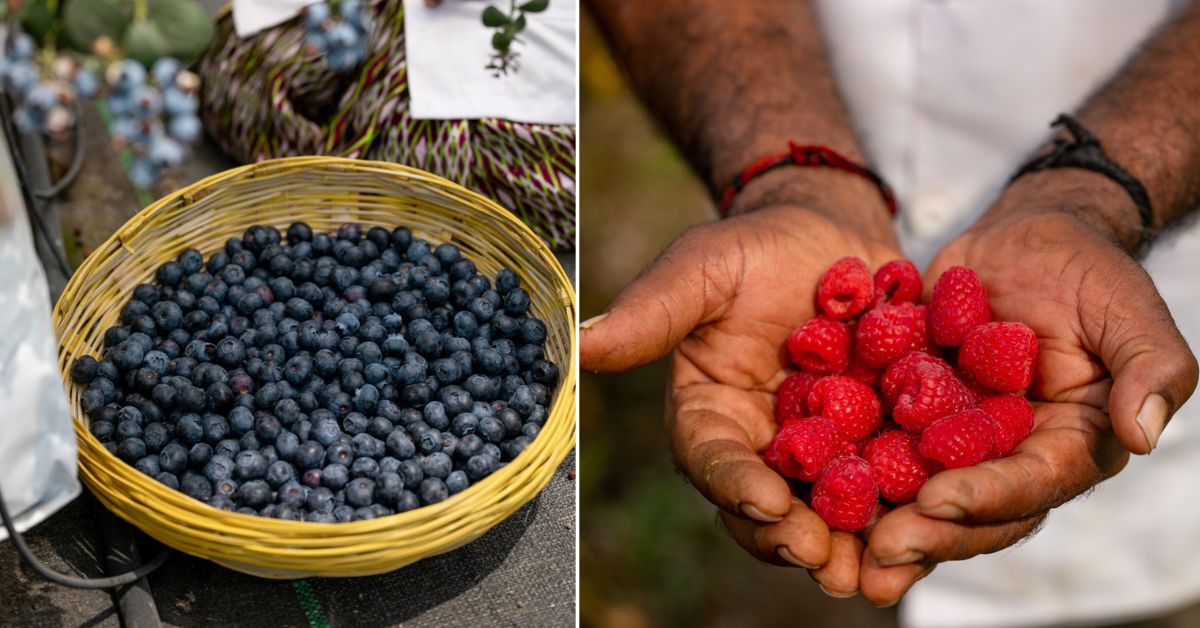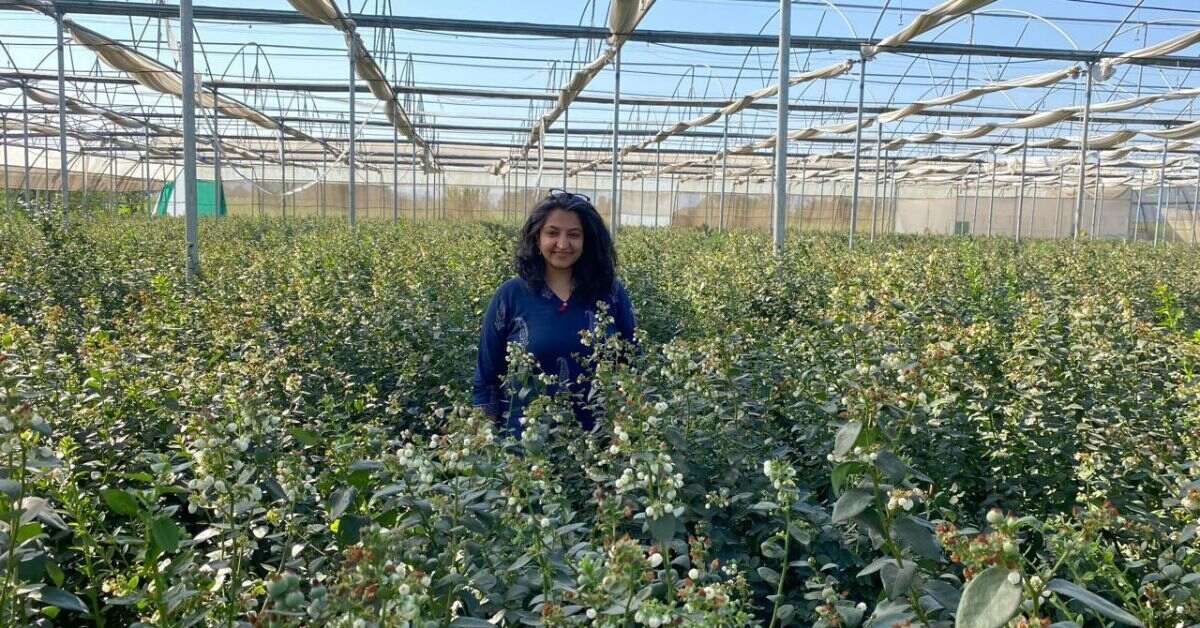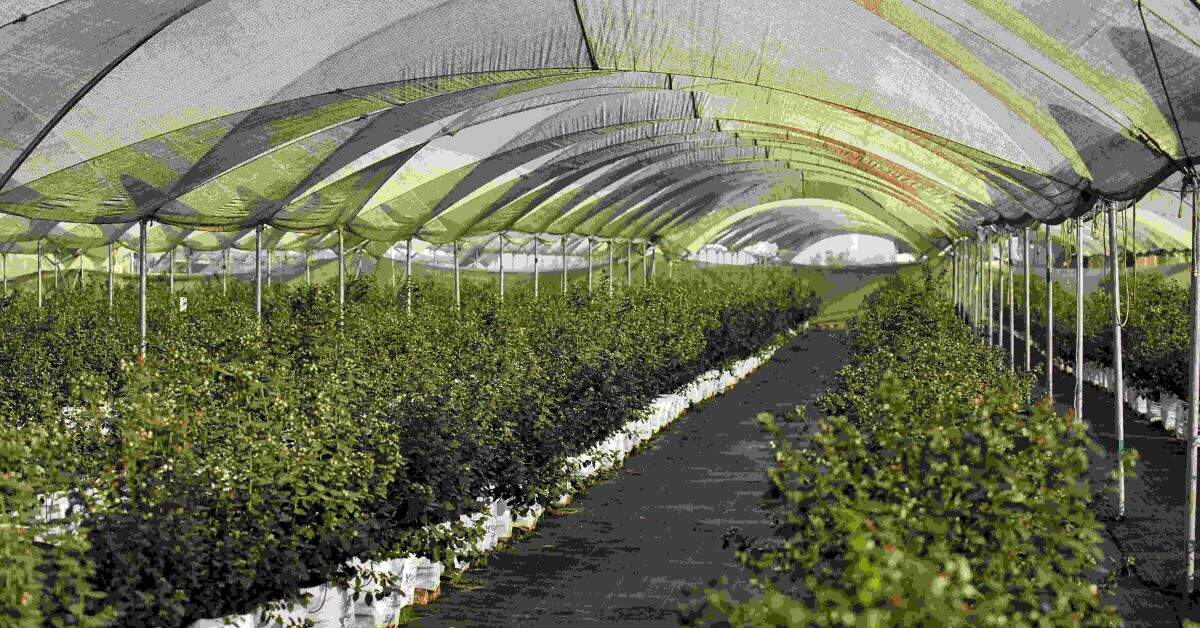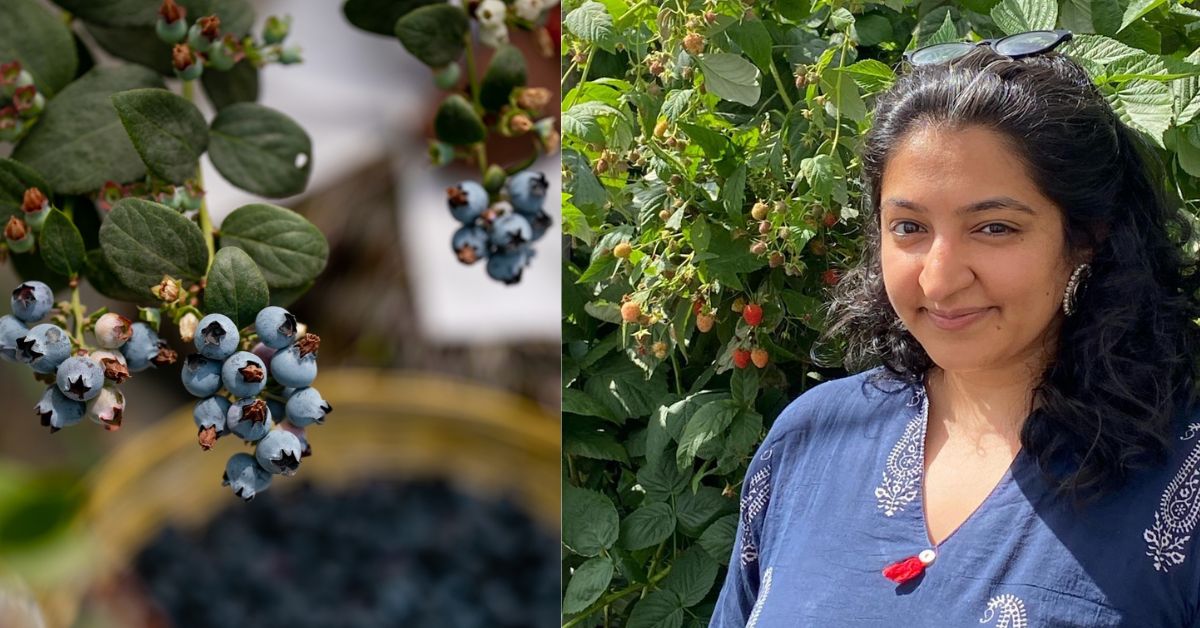Every year, tonnes of exotic fruits including blueberries and raspberries are imported for urban Indian consumers owing to their wide range of health benefits. Data shows that raspberry, blackberry, blueberry, and cranberry imports into India skyrocketed to 870 tonnes in 2022 – indicating a surge of
compared to 2021.
According to the US Highbush Blueberry Council ( ), the imports of blueberries in fresh and dried forms grew from almost zero in 2009 to 1,900 tonnes in 2020, making India one of the world’s top importers of blueberries. This trade between the United States and India is growing at a rate of around 30 percent per year.
While these numbers are rising annually, Maharashtra’s Keya Salot has stepped up to bring these numbers down to some extent. “In 2021-22, India was importing $2.2 billion of and vegetables. That’s not really a good number. I wanted to get into the sector to cultivate these exotic varieties locally. By doing this, it would also make them affordable for consumers beyond metros,” she tells The Better India.
In 2021, Keya set up Farm2Fam to cultivate these exotic berries. Today, she has scaled up the production on 20 acres of land and estimates a production of at least 135 tonnes of berries this year.

Blueberries and raspberries are cultivated largely in the United States, Russia, Mexico, Serbia, and Poland.
In conversation with The Better India, she sheds light on the innovative methods that helped her cultivate berries in the harsh weather conditions of the country.
Born and brought up in Mumbai, Keya was a lawyer by profession. After pursuing law from Mumbai’s Government Law College, she continued her practice with law firms for nearly four years until she understood her calling.
“I had always wanted to become a farmer. For me, the idea of pursuing law was always to later focus on entrepreneurship. But before that, I wanted to get good access to the legal framework to build a successful business. I wanted to work in an impactful sector to create a very purpose-driven entrepreneurship programme which would not only benefit me personally but would also benefit the society,” says the 32-year-old.
In 2018, she took a break from work to understand the nitty-gritties of farming as she did not have any agricultural background. To begin with, Keya started growing about 30 varieties of microgreens in a vertical set-up made on the terrace. Soon, she started supplying them to restaurants, and within six months, she on-boarded 50 clients. This boosted her confidence and allowed her to establish retail connections.
“During this transition, I started researching on the kinds of crops grown in other countries that had gained a lot of traction in agriculture. Compared to countries in South and Central America, India has not graduated beyond growing major basic crops like paddy, sugarcane, and wheat,” she shares.

In 2021, Keya set up Farm2Fam to cultivate exotic berries.
“Even today, despite a significant portion of the economy and the population being dependent on agriculture, we are not able to produce high-value crops. We needed to choose crops that will get a slightly longer cycle but will give definitive returns,” she adds.
After a year of research, Keya zeroed down to cultivating the crop of – cultivated largely in the United States, Russia, Mexico, Serbia, and Poland.
Keya shares the major challenge in cultivating these exotic varieties was to make them adaptable to the Indian weather conditions. “While blueberries require cold winters and moderate to high rainfall throughout its growing season, raspberries are also suited to temperate regions with cool summers and mild winters,” she adds.
By late 2019, Keya along with her husband, Vimal Salot, visited Mexico and Europe which had similar geometric conditions to Maharashtra. In 2020, she imported the first set of saplings adaptable to Indian weather conditions and harvested the first commercial yield in 2021.

Keya installed low-cost tunnels in about 80 percent of her farm.
In order to cultivate them in the tropical climate of Maharashtra, Keya opted for the tunnel method of cultivation that overcame the drawbacks of extreme weather conditions.
“We are required to protect crops like raspberries and blueberries from extreme temperatures. Currently, India only has poly houses as an infrastructure for protected cultivation, and in geographical climates like Maharashtra, we need protection from harsh conditions rather than adding heat,” she shares.
“So, we developed our own low-cost tunnel structures for growing these berries where we can add or remove the plastic cover as per the weather requirements and maintain ideal temperature conditions for the growth of plants. With this, we can now provide a warmer climate during the winter nights and cooler conditions for growth during the summer days, in addition to protecting the crops from rain. This technique has its origin in the European countries where they use the structure to protect the heat,” she adds.
Keya installed low-cost tunnels in about 80 percent of her farm and is cultivating at least seven varieties of exotic berries. “ under high tunnels protects them from extremes of temperature, requires less water, and yields more fruit. This method also helps blueberries ripen earlier. Instead of the usual harvest period that lasts only for a few weeks, we can harvest yields for four to five months with this method,” she informs.

Keya expects a bountiful harvest of at least 135 tonnes of berries this season.
Highlighting one of the other challenges she faced in setting up the farm business in Talegaon, Pune, Keya says, “Getting access to land was extremely difficult for us as it was very difficult to convince a farmer to lease their land to a city dweller. As you do not have a base in a village, it invites a lot of aversion. But after 3 to 4 months of trying our hands, we got our first piece of land. It took some time to build trust among the farmers.”
Today, she has expanded the production on 20 acres of land and expects a bountiful harvest of at least 135 tonnes of berries this season. As of now, she has collaborated with delivery partners like Swiggy and Zepto, and supermarkets like Star Bazaar, KisanKonnect, Reliance Retail, and Nature’s Basket to deliver the produce.
Talking about her transition from being a lawyer to an innovative farmer, Keya says, “It is a perception that agriculture is not a profitable business. At the same time, a huge portion of our economy rests on it. It is the responsibility of people with exposure to change this perception rather than fear it.”
“I feel if I had only practiced law, the kind of impact that I would have had would have been much smaller than what I’m having today in terms of cultivating new kinds of crops by using innovative methods,” she adds.
Edited by Padmashree Pande; All photos: Keya Salot.
According to the US Highbush Blueberry Council ( ), the imports of blueberries in fresh and dried forms grew from almost zero in 2009 to 1,900 tonnes in 2020, making India one of the world’s top importers of blueberries. This trade between the United States and India is growing at a rate of around 30 percent per year.
While these numbers are rising annually, Maharashtra’s Keya Salot has stepped up to bring these numbers down to some extent. “In 2021-22, India was importing $2.2 billion of and vegetables. That’s not really a good number. I wanted to get into the sector to cultivate these exotic varieties locally. By doing this, it would also make them affordable for consumers beyond metros,” she tells The Better India.
In 2021, Keya set up Farm2Fam to cultivate these exotic berries. Today, she has scaled up the production on 20 acres of land and estimates a production of at least 135 tonnes of berries this year.

Blueberries and raspberries are cultivated largely in the United States, Russia, Mexico, Serbia, and Poland.
In conversation with The Better India, she sheds light on the innovative methods that helped her cultivate berries in the harsh weather conditions of the country.
Quit law to become a farmer
Born and brought up in Mumbai, Keya was a lawyer by profession. After pursuing law from Mumbai’s Government Law College, she continued her practice with law firms for nearly four years until she understood her calling.
“I had always wanted to become a farmer. For me, the idea of pursuing law was always to later focus on entrepreneurship. But before that, I wanted to get good access to the legal framework to build a successful business. I wanted to work in an impactful sector to create a very purpose-driven entrepreneurship programme which would not only benefit me personally but would also benefit the society,” says the 32-year-old.
In 2018, she took a break from work to understand the nitty-gritties of farming as she did not have any agricultural background. To begin with, Keya started growing about 30 varieties of microgreens in a vertical set-up made on the terrace. Soon, she started supplying them to restaurants, and within six months, she on-boarded 50 clients. This boosted her confidence and allowed her to establish retail connections.
“During this transition, I started researching on the kinds of crops grown in other countries that had gained a lot of traction in agriculture. Compared to countries in South and Central America, India has not graduated beyond growing major basic crops like paddy, sugarcane, and wheat,” she shares.

In 2021, Keya set up Farm2Fam to cultivate exotic berries.
“Even today, despite a significant portion of the economy and the population being dependent on agriculture, we are not able to produce high-value crops. We needed to choose crops that will get a slightly longer cycle but will give definitive returns,” she adds.
After a year of research, Keya zeroed down to cultivating the crop of – cultivated largely in the United States, Russia, Mexico, Serbia, and Poland.
Making foreign crops adaptable with innovative methods
Keya shares the major challenge in cultivating these exotic varieties was to make them adaptable to the Indian weather conditions. “While blueberries require cold winters and moderate to high rainfall throughout its growing season, raspberries are also suited to temperate regions with cool summers and mild winters,” she adds.
By late 2019, Keya along with her husband, Vimal Salot, visited Mexico and Europe which had similar geometric conditions to Maharashtra. In 2020, she imported the first set of saplings adaptable to Indian weather conditions and harvested the first commercial yield in 2021.

Keya installed low-cost tunnels in about 80 percent of her farm.
In order to cultivate them in the tropical climate of Maharashtra, Keya opted for the tunnel method of cultivation that overcame the drawbacks of extreme weather conditions.
“We are required to protect crops like raspberries and blueberries from extreme temperatures. Currently, India only has poly houses as an infrastructure for protected cultivation, and in geographical climates like Maharashtra, we need protection from harsh conditions rather than adding heat,” she shares.
“So, we developed our own low-cost tunnel structures for growing these berries where we can add or remove the plastic cover as per the weather requirements and maintain ideal temperature conditions for the growth of plants. With this, we can now provide a warmer climate during the winter nights and cooler conditions for growth during the summer days, in addition to protecting the crops from rain. This technique has its origin in the European countries where they use the structure to protect the heat,” she adds.
Keya installed low-cost tunnels in about 80 percent of her farm and is cultivating at least seven varieties of exotic berries. “ under high tunnels protects them from extremes of temperature, requires less water, and yields more fruit. This method also helps blueberries ripen earlier. Instead of the usual harvest period that lasts only for a few weeks, we can harvest yields for four to five months with this method,” she informs.

Keya expects a bountiful harvest of at least 135 tonnes of berries this season.
Highlighting one of the other challenges she faced in setting up the farm business in Talegaon, Pune, Keya says, “Getting access to land was extremely difficult for us as it was very difficult to convince a farmer to lease their land to a city dweller. As you do not have a base in a village, it invites a lot of aversion. But after 3 to 4 months of trying our hands, we got our first piece of land. It took some time to build trust among the farmers.”
Today, she has expanded the production on 20 acres of land and expects a bountiful harvest of at least 135 tonnes of berries this season. As of now, she has collaborated with delivery partners like Swiggy and Zepto, and supermarkets like Star Bazaar, KisanKonnect, Reliance Retail, and Nature’s Basket to deliver the produce.
Talking about her transition from being a lawyer to an innovative farmer, Keya says, “It is a perception that agriculture is not a profitable business. At the same time, a huge portion of our economy rests on it. It is the responsibility of people with exposure to change this perception rather than fear it.”
“I feel if I had only practiced law, the kind of impact that I would have had would have been much smaller than what I’m having today in terms of cultivating new kinds of crops by using innovative methods,” she adds.
Edited by Padmashree Pande; All photos: Keya Salot.
